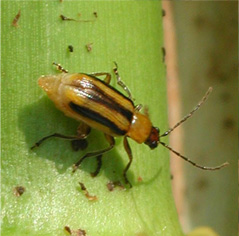Scientist: insect resistance shows unsustainability of GM corn
By Ken Roseboro
Published: December 27, 2011
Category: GM Food Environmental Risks

To access all the articles in this month's issue of The Organic & Non-GMO Report, SUBSCRIBE NOW.
A recent report from the US Environmental Protection Agency showing that insects are becoming resistant to Monsanto’s genetically modified Bt corn demonstrates that GM corn is not sustainable, says Doug Gurian-Sherman, senior scientist at the Union of Concerned Scientists (UCS).
“The resistant rootworm issue is really just a symptom of a much bigger and more fundamental problem: Midwestern US agriculture is not sustainable,” Gurian-Sherman wrote on a blog on UCS’s website. “This is because good agroecological practices like alternating, or rotating, crops are not widely practiced due to the drive for shortsighted gains in efficiency.
Current practices, including genetic engineering, have been pushing us toward greater simplification of our cropping systems—the opposite of diverse, biologically-sound agriculture.”
The EPA report confirmed that corn rootworms are becoming resistant to Monsanto’s GM corn in four states: Iowa, Illinois, Minnesota, and Nebraska.
The Bt corn contains the Cry3Bb1 protein that is lethal to rootworm. Introduced in 2003, the Bt corn is now grown on 37 million acres in the US.
Because so many farmers rely on the GM corn, the potential impact of the resistance problem is “huge,” says University of Arizona’s Bruce Tabashnik, a leading expert on the adaptation of insects to GM crops.
The report also criticized Monsanto for inadequate monitoring of the resistance problem. EPA said that Monsanto has been receiving reports of resistance from farmers since 2004 and sometimes takes up to two years to respond to the reports.
Monsanto says there has been no scientific confirmation of insect resistance even though researchers from Iowa State University published a paper about the problem this summer.
(Sources: Bloomberg News, St. Louis Post-Dispatch, National Public Radio, Mother Jones)
© Copyright The Organic & Non-GMO Report, December/January 2012




